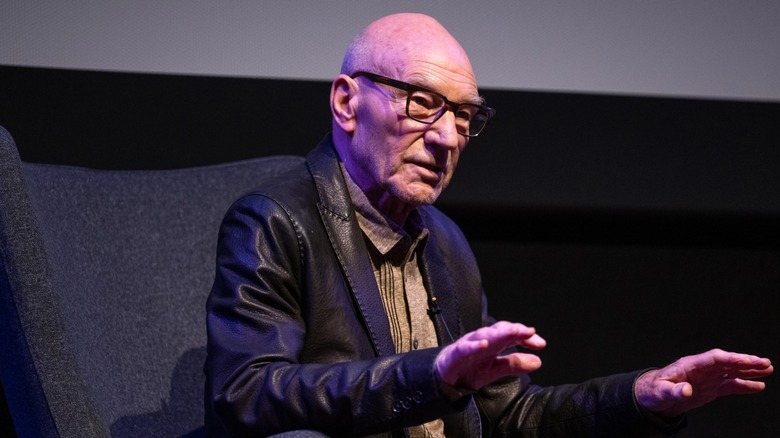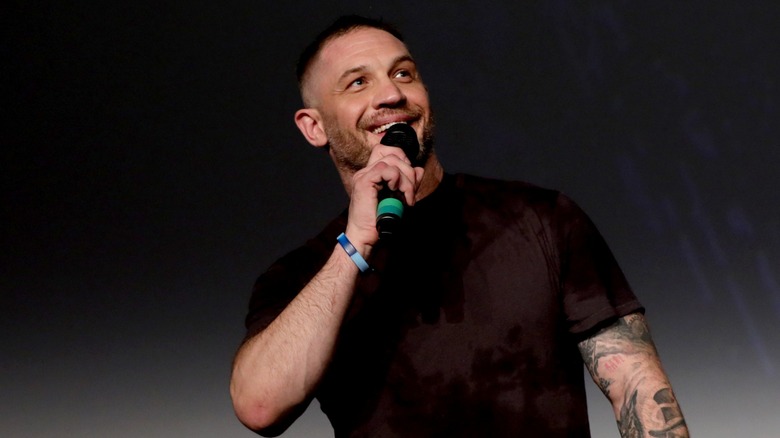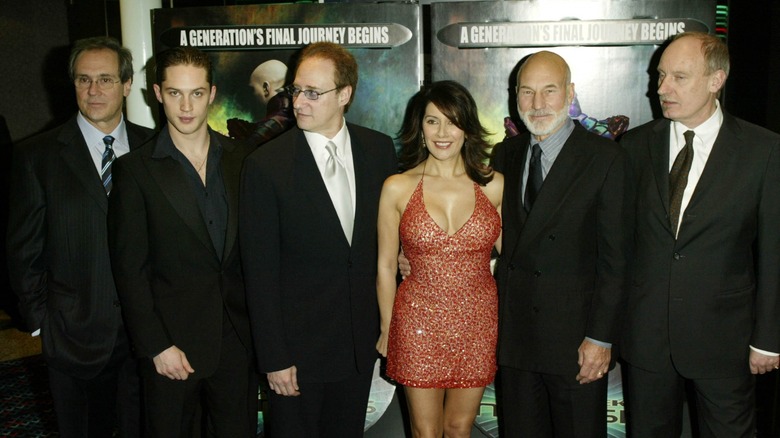Why Patrick Stewart Thought Tom Hardy Was Going To Be A Failed Actor
The following article includes discussions of drug and alcohol addiction.
Sometimes you make an assumption that turns out to be dead wrong, and Sir Patrick Stewart did just that after filming "Star Trek: Nemesis" with Tom Hardy. Stewart has played Jean-Luc Picard in a variety of different "Star Trek" properties. But, according to Insider, Stewart's memoir "Making It So" included a not-exactly-positive description of his experience working with Hardy on "Nemesis," alongside his initial opinion on the then-up-and-coming actor.
"I didn't have a single exciting scene to play," Stewart wrote, "and the actor who portrayed the movie's villain, Shinzon, was an odd, solitary young man from London. His name was Tom Hardy." Hardy reportedly never greeted or said goodbye to the other cast members, and when he wasn't shooting a scene, Hardy and his girlfriend stayed in the actor's trailer. "He was by no means hostile — it was just challenging to establish any rapport with him," Stewart noted.
Hardy was honored to get the chance to work with Stewart
After the "Venom" star finished his final scene of the movie and walked out without saying goodbye (as usual), Sir Patrick Stewart made a prediction to his fellow "Star Trek" actors, Brent Spiner and Jonathan Frakes: "As [the door] closed, I said quietly to Brent and Jonathan, 'And there goes someone I think we shall never hear of again.'" However, as the veteran performer acknowledged, "It gives me nothing but pleasure that Tom has proven me so wrong."
Tom Hardy has had roles in major productions including "Inception," "The Dark Knight Rises," "Mad Max: Fury Road," and "Peaky Blinders." The actor has tons of celebrity mates too — for example, Hardy is friends with Prince Harry, while the British actor got a tattoo that came from losing a bet to a Hollywood legend. In a 2002 interview prior to the release of "Star Trek: Nemesis," Hardy also had a different perspective on his working relationship with Stewart.
When asked if Stewart gave him any pointers on playing Picard's clone, he first joked about Stewart harshly criticizing his performance on set. Then, Hardy made it clear he was kidding around by stating, "No ... He was wonderful! He was. It was a good time. We would sit and talk. He'd tell me what he thought worked and what he thought didn't. It was a joy to work with him," (via IGN). Hardy also confirmed that he enjoyed watching the living legend work.
The actor was very nervous on the set of the movie
In a 2014 interview with Total Film magazine (which was uploaded in full to Tumblr by a fan), Tom Hardy opened up about how scared he was filming "Star Trek: Nemesis." The actor admitted, "I was genuinely out of my depth. The whole thing was, 'How can I do this?'" He abstained from drinking alcohol during the entire three-month shoot and, since about half of the movie had been filmed when it was his turn to work, Hardy recalled, "So it was like walk in, straight in, out of the frying pan, into the fire, get on with it."
Unfortunately, "Star Trek: Nemesis" did not do very well — it only earned a 38% rating from critics on Rotten Tomatoes. Hardy also dealt with drug and alcohol addiction around that time, which started when he was about 11 years old. The actor got sober in 2003, according to a 2015 interview with Essentials magazine, where he revealed, "I was told very clearly, 'You go down that road, Tom, you won't come back. That's it. All you need to know,'" (via Time).
Hardy also discussed his issues with The Guardian, asserting, "Now I know my beast and I know how to manage it." Evidently, he has been very successful, both personally and professionally, since venturing into the world of "Star Trek," and will no doubt continue to succeed. Sir Patrick Stewart would certainly be proud.
If you or anyone you know needs help with addiction issues, help is available. Visit the Substance Abuse and Mental Health Services Administration website or contact SAMHSA's National Helpline at 1-800-662-HELP (4357).


